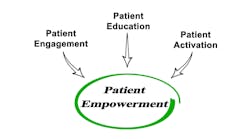For RHIO advocates, watching Congress debate health information technology can be frustrating, as too often bipartisan support for the concept in general gives way to partisan bickering and stalled legislation regarding the details. But this year may be different.
The Wired for Health Care Quality Act of 2007 (S. 1693), the omnibus health information technology bill, has bipartisan support and provides for RHIO grant funding, according to David Roberts, HIMSS' vice president of government relations. Among its many provisions, the bill would authorize $139 million in both 2008 and 2009 to establish grants creating regional or local health information systems. Eligible groups would have to provide matching funds of $1 for every $2 in federal funding.
Although the bill recently passed the Health Education, Labor and Pensions Committee, it is running into some opposition, Roberts says. "Some advocates argue it doesn't do enough to address privacy concerns," he notes. Also, Bush administration officials have said they oppose grant funding to promote health IT. They would prefer to support healthcare businesses paying for IT improvements as part of their normal costs. "This administration is determined to provide leadership but not funding for health IT," Roberts says.
As the bill moves forward, "The privacy concerns will be looked at, but the grants will stay," Roberts predicts. He added that while nothing major is brewing in terms of new regulations from the U.S. Department of Health and Human Services, RHIO watchers should keep their eyes on state capitals. "There is a lot of activity in legislatures to create state-level RHIOs," he says, including in Washington state and Rhode Island.
Privacy and security issues are important outside the Beltway too, but for most RHIOs it's still too early to tell if the privacy policies they've agreed to will work, says Sheera Rosenfeld, director of the health information technology practice at Avalere Health LLC, a Washington, D.C., consulting firm focused on healthcare business strategy and public policy. "Many have adopted (privacy) policies of their largest members such as hospitals," she says. "It may be that they will have to revisit them and evolve an overarching policy that better fits the whole entity."
An author of the June 2007 report "Privacy, Security and the Regional Health Information Organization," conducted for the California Healthcare Foundation, Rosenfeld says that although RHIOs are being built to improve care delivery to patients, the organizations are having trouble engaging consumers. "Many are doing focus groups, or putting a consumer advocate on their board. There's a recognition patients needs to be in the mix, but it is not playing out yet," she says.
Sticky privacy issues include how consumers should be able to interact with their data and whether they should be allowed to limit how their personal data is used. Rosenfeld says many RHIOs are moving toward having a consumer portal, but allowing patients to limit access is technically complex and raises issues about what information providers need access to. Consumer portals will happen eventually, but she added, "It's far less likely that consumers will be able to micromanage that information."
David Raths is a contributing writer based in Philadelphia
